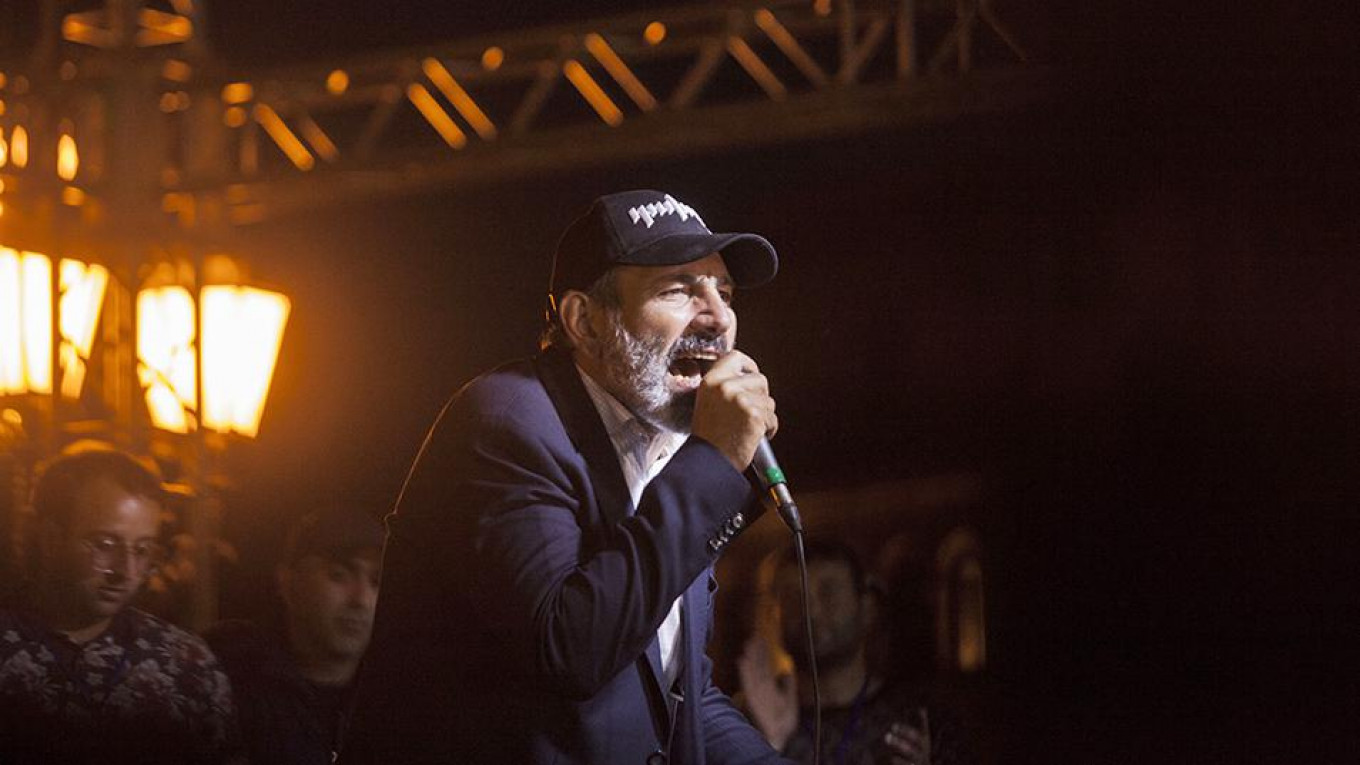The leader of an Armenian protest movement that forced the country’s veteran leader to step down announced on Tuesday a nationwide campaign of civil disobedience after the ruling party thwarted his bid to take over as prime minister.
Addressing tens of thousands of people gathered in a square in the Armenian capital, Nikol Pashinyan said that starting from 8:15 (4:15 GMT) Wednesday morning, his supporters would block roads, railways and airports.
The planned day of protest in the small ex-Soviet state sets up a standoff between Pashinyan’s movement, which has mobilized thousands of people to take to the streets, and a ruling elite which is determined to hold on to power and still controls the security apparatus.
“We will block the streets, the airports, the metro, the railway, everything that can be blocked,” Pashinyan told his cheering supporters on Yerevan’s Republic Square.
“If everyone participates in a total act of civil disobedience, this will be a total victory of the people of Armenia. Our struggle is a struggle of non-violence, it is a peaceful act of civil disobedience.”
After days of protests, veteran leader Serzh Sargsyan stepped down as prime minister last week. That seemed to signal a dramatic shift in power in Armenia, an ex-Soviet state closely aligned to Russia that has been run by the same cadre of people since the late 1990s.
Pashinyan, a 42-year-old former journalist who spent two years in jail for fomenting unrest, was submitted to parliament as the only nominee for the vacant prime minister’s job.
But the ruling Republican Party, allied to Sargsyan, has a majority in the legislature and after hours of acrimonious debate it withheld its support for Pashinyan’s candidacy, leaving him short of the support he needed.
Earlier Tuesday, Pashinyan had warned the ruling elite it could face a “tsunami” of anger from the people if it stymied his move to become prime minister.
Supporters of Pashinyan, who had spent the day in the capital’s Republic Square to watch the parliamentary debate on two huge screens, shouted “shame” when the result of the vote was shown.
“It showed once again that they don’t care about us, about the ordinary people,” said Gurgen, a 61-year-old unemployed man who was among the crowd.
The crisis in Armenia, which has a population of only about 3 million people and has Russian military bases on its territory, is being closely watched in Moscow.
Officials there are wary of a repeat of a popular revolt in Ukraine in 2014 that swept to power new leaders who pulled away from Moscow’s orbit.
Protests flared when Sargsyan, an establishment veteran, announced he was seeking to become prime minister. He had previously been president, but was limited by the constitution from seeking another term.
Some Armenians saw Sargsyan’s bid for the prime minister’s job as a cynical ploy to extend his grip on power. Some voters accuse Sargsyan and his associates of cronyism and corruption, an allegation they deny.
Pashinyan has pledged to keep Armenia close to Moscow, saying the changes he wants to make would instead focus on rooting out graft.
During the parliamentary debate, Republican Party lawmakers accused Pashinyan or being an irresponsible rabble-rouser, they alleged he recruited children to join his protest movement, and said he lacked the qualities to command the Armenian armed forces.
A Message from The Moscow Times:
Dear readers,
We are facing unprecedented challenges. Russia's Prosecutor General's Office has designated The Moscow Times as an "undesirable" organization, criminalizing our work and putting our staff at risk of prosecution. This follows our earlier unjust labeling as a "foreign agent."
These actions are direct attempts to silence independent journalism in Russia. The authorities claim our work "discredits the decisions of the Russian leadership." We see things differently: we strive to provide accurate, unbiased reporting on Russia.
We, the journalists of The Moscow Times, refuse to be silenced. But to continue our work, we need your help.
Your support, no matter how small, makes a world of difference. If you can, please support us monthly starting from just $2. It's quick to set up, and every contribution makes a significant impact.
By supporting The Moscow Times, you're defending open, independent journalism in the face of repression. Thank you for standing with us.
Remind me later.






